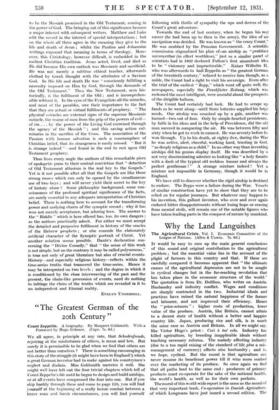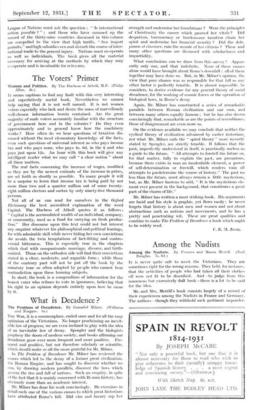Why the Land Languishes
IT would be easy to sum up the main general conclusions of this sound and original contribution to the agricultural problem ; but the essential value lies in the account of the plight of farmers in this country and that. If these are carefully compared it becomes apparent that " the ultimate causes of the agricultural depression are not to be sought in cyclical changes but in the far-reaching revolution that has taken place in the economic structure of the world." The quotation is from Dr. Dollfuss, who writes on Austria. Husbandry and industry conflict. Wages and conditions are sharply contrasted in the two. Industrial ideals and practices have ruined the natural happiness of the farmer and labourer, and not improved their efficiency. Hence the " price-scissors " : higher costs of production, lower value of the produce. Austria, like Britain, cannot attain to a decent state of health without a better and happier country life. Japan, producing rice and silk, is in much the same case as Austria and Britain. In all we might say, like Victor Hugo's priest : Ceei a tue vela. Industry has killed agriculture, by breeding inapplicable ideals without teaching necessary reforms. The malady affecting industry (due to a too rapid raising of the standard of life plus a mis- management of currency) affects also husbandry ; and is, we hope, cyclical. But the moral is that agriculture can never resume its beneficent power till it wins more control over the marketing of its produce. So once again we find that all paths lead to the same end : producers of primary products must co-operate for the sake of the national health, the world's health, as well as for their own pockets.
The moral of this world-wide report is the same as the moral of that very important book, Co-operation in Danish Agriculture, of which Longmans have just issued a second edition. The League of Nations must ask the question : Is international action possible ? " ; and those who have summed up the record of the thirty-nine countries discussed in this volume are compelled to the view that high tariffs, free import permits," and high subsidies vex and disturb the course of inter- national trade to the general injury. Nations must co-operate as well as individuals. The book gives all the material necessary for arriving at the methods by which they may ca-operate and is invaluable for reference.































 Previous page
Previous page